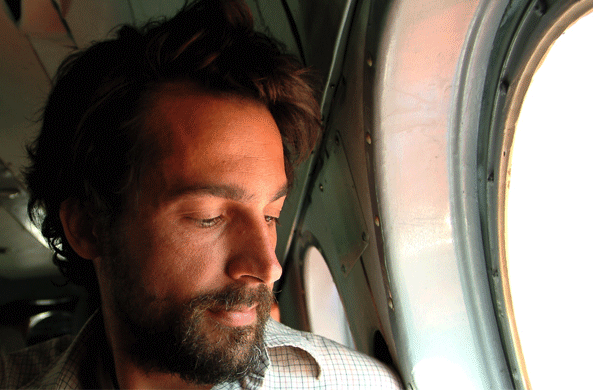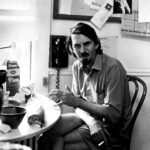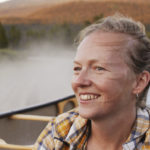Robert Reid grew up in Oklahoma and left for new adventures — of travel and life — in New York, San Francisco, Vietnam and London. He worked five years in-house at Lonely Planet, where he was series publishing manager for shoestring guides, then left become a full-time writer from his home in Brooklyn. He’s updated 21 Lonely Planet guidebooks — including New York City, Central America, Trans-Siberian Railway and Myanmar (Burma) — and created his own experimental free guidebook to Vietnam. His articles have appeared in the New York Times, San Francisco Chronicle, World Hum and Wanderlust.
How did you get started traveling?
I blame — and I mean blame — a family trip taken at age five to Mexico City. It’s hard to remember much, but what I do has changed everything for me. Climbing up a pyramid, getting an Aztec sun god idol, going down an Aztec flower-market canal, petting dogs in a park lined with Spanish cathedrals. Everything looked, sounded, smelled unlike anything back in Oklahoma. That trip ruined me on travel for life.
How did you get started writing?
I always did. As a kid, I made comics with unsatisfying storylines — ‘Harry scores a TD/yay!’ — then moved to bad rock lyrics and mini plays involving Orc attacks in high school. In college, I led the arts page of the university paper, interviewing bassists for B-list rock bands, which I took far more seriously than necessary. In New York City, I stumbled into a position at House Beautiful magazine, of all things, where I wrote about ‘winner sconces’ for a bit, before finally starting some travel writing while living in Vietnam.
What do you consider your first “break” as a writer?
Have I had one yet? Well, while working for Vietnam News, an English-language paper that was starving for any ‘native speaker’ content, I used the automatic bylines to get some clips and figure out how to do travel writing (aka ‘getting the crap out of the pen’). Those helped me get a job in-house at Lonely Planet, where I worked for several years, then left to work on guidebooks, which has given me enough travel experience to write about places as far off as Siberia, Bulgaria, Chiapas and the Bronx. It’s all still a work-in-progress. I’m still learning.
As a traveler and fact/story gatherer, what is your biggest challenge on the road?
Time. There is no end to what you can see, what you can ask, where you can go. You have to learn to not really trust everyone’s take — locals sometimes can’t see their homes from an outside perspective, and some ‘help’ can end up losing some precious time. Also you can’t always trust yourself always either. I may be feeling bad one day, maybe it’s wet and windy, and a Russian waiter might snap at me, and I’m suddenly thinking ‘Khabarovsk: crappy city.’ It isn’t though. So often secrets of the road may lurk in unexpected places. So I ask and ask and ask questions. Random things sometimes — about ghosts, soccer rivalries, sewage problems, great moustached heroes, fist fights at City Hall. Sometimes I ask questions for answers I already know. And try to write down everything locals say — you never know when a funny thing they say can be useful in an article way down the line. And time is so short.
What is your biggest challenge in the research and writing process?
I did a couple articles for the New York Times recently where I had a fairly clear-cut template to adhere to — but the quirky little sign-off quote I needed just wasn’t coming from the Vladivostok locals. I don’t say it cynically — getting quotes is a great way to give voice to a place — but after awhile I felt like I was pulling teeth. Deeply lodged, stubborn, suspicious teeth that didn’t like me at all.
What is your biggest challenge from a business standpoint?
Getting steady work and enough to live on. I’ve done a lot of Lonely Planet work, which sometimes pays OK and sometimes doesn’t at all. But at least these are bigger projects than the one-offs I’ve done for newspapers or websites.
Have you ever done other work to make ends meet?
I’ve made a college football blog for a soon-to-fail website, edited newsletters, contributed to new travel websites. If I didn’t have an understanding wife — with a nice steady salary — I probably couldn’t swing this work and keep a New York residence. So far, anyway.
What travel authors or books might you recommend and/or have influenced you?
Actually I don’t read that much travel writing. Early on, my biggest travel inspiration always came from — and sometimes still does — from thumbing through guidebooks. I used to go to bookstores for hours and read through Lonely Planet books to places I’ve still not visited — Paraguay, Mali, Mongolia — and plot out an imaginary trip.
Some of the best parts of travel coming from starting to care about things you normally don’t care about — handicrafts, goat meat, pharmacy museums. And so I’m regularly inspired by random stories I see in non-travel sections of the New York Times like City or Styles. Articles by ‘regular’ feature writers, not necessarily ‘travel writers,’ who cover events around them, not just across the globe.
As far as travel writers go, and it does sort of embarrass me to say it, but that Paul Theroux is hard to beat. And Ian Frazier’s great. I actually enjoyed Chuck Thompson’s Smile When You’re Lying, which upset some travel writers for taking pot shots at travel magazines and guidebooks. I didn’t always agree with him 100%, but I liked how he compared rock critics’ overly doting adoration of Eric Clapton with glowing travel-mag clichés of destinations like the Caribbean, or how his adolescent drug scores qualify as his first indie travel experiences. I’m totally with him on Clapton — o-ver-rated!
What advice and/or warnings would you give to someone who is considering going into travel writing?
Travel writing is work. So it’s important to know why you’re getting into it and what you want from it. I can’t count the numbers of times I’ve said of a place, ‘this is great — I really need to come back on vacation.’ Actually I generally prefer going to places I wouldn’t go on vacation — I once picked Nebraska over the Caribbean (and do not regret it), Siberia over India or Bhutan. I go to fulfill a job, and collect a wealth of experiences I can later use (hopefully) in some other writings.
Getting started is easy as looking around you — your home may be boring to you, but it doesn’t have to be to others. Or maybe create a guide on something that isn’t out there. Like ‘Visiting Bear Attack Sites of the Western Hemisphere’ using a free blog template. That might get some attention.
What is the biggest reward of life as a travel writer?
Of course there are times I feel I’m just snoozing reality. Taking on an assignment to hang out with 20-year-old students at nightclubs in Sofia’s outskirts, or riding the Trans-Siberian (once again), rather than retreating into a cubicle for a steady paycheck and benefits. The biggest reward easily is meeting people. Travel writing forces you to be 100% curious at all times, and going into funny places and asking questions in places normal visitors wouldn’t ever really see. And now I regularly exchange emails from new friends in places like Yakutsk, Sofia and Bogota, so it’s hard to imagine stopping anytime soon.





